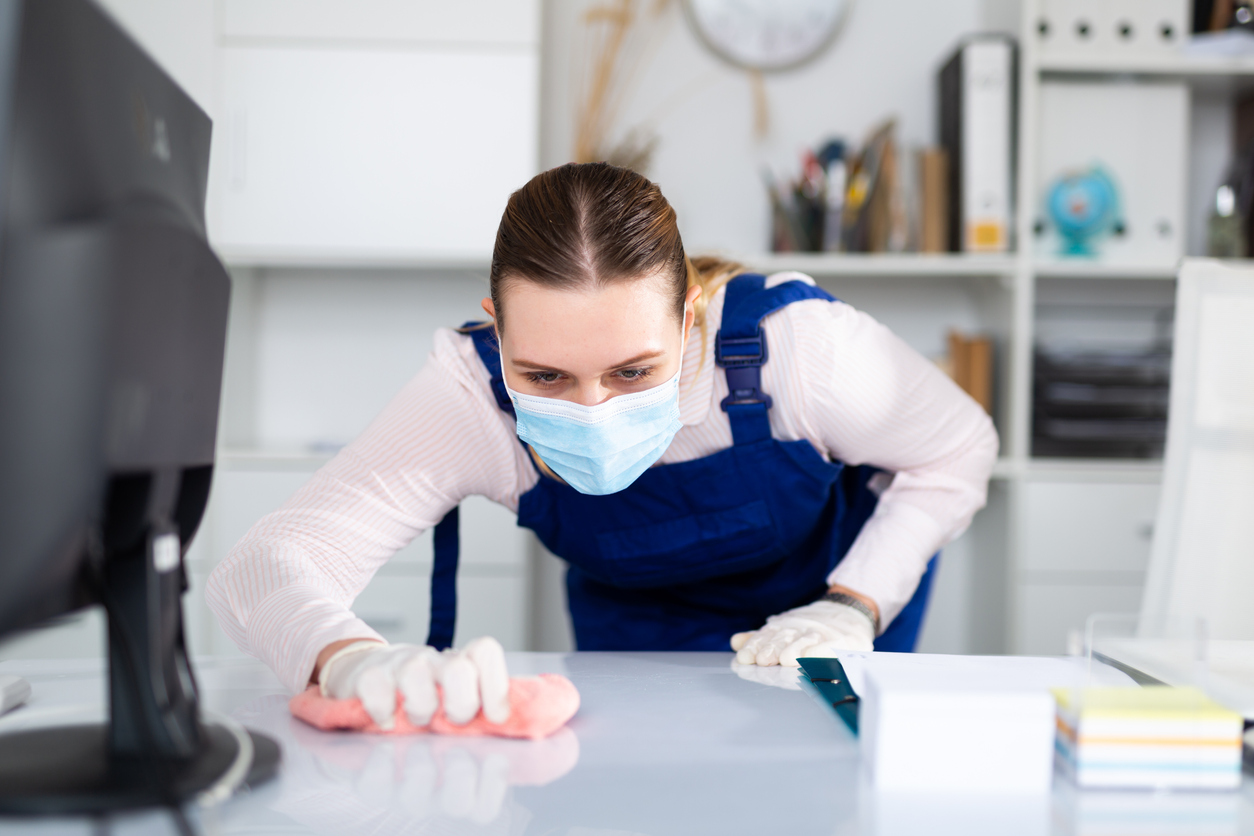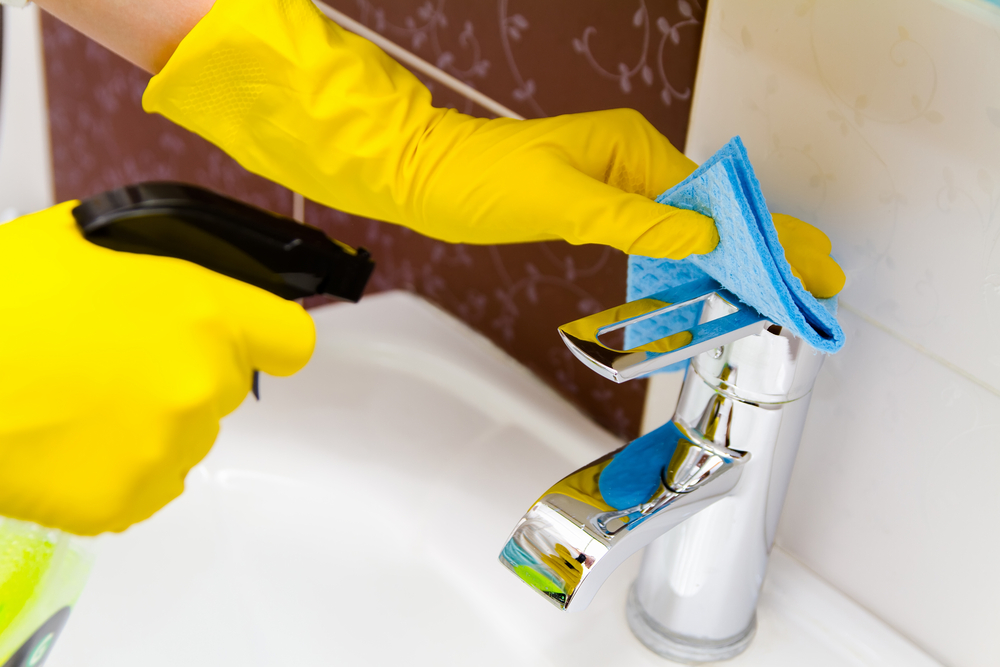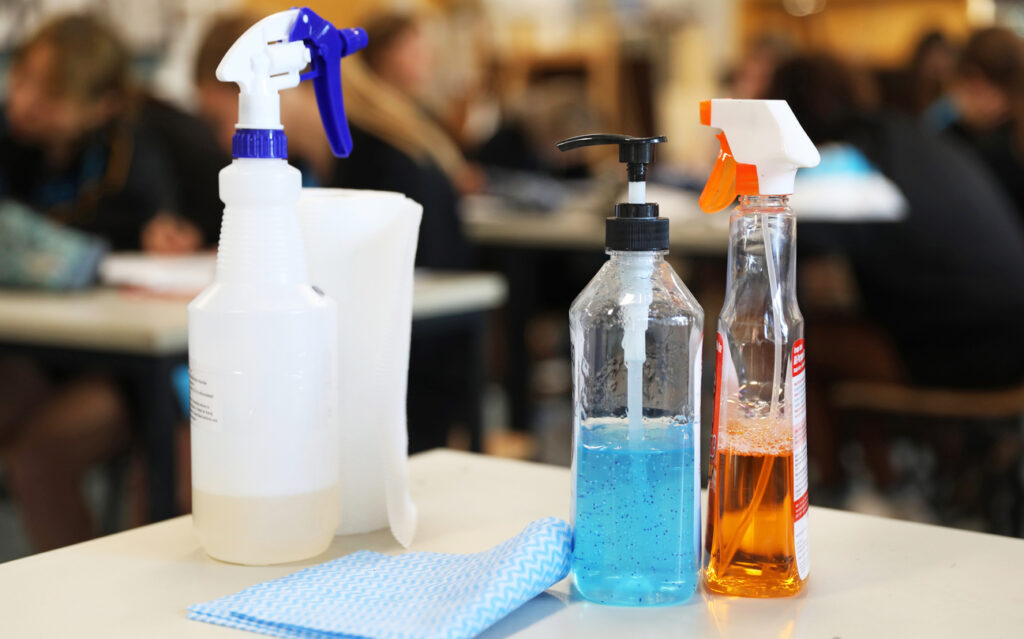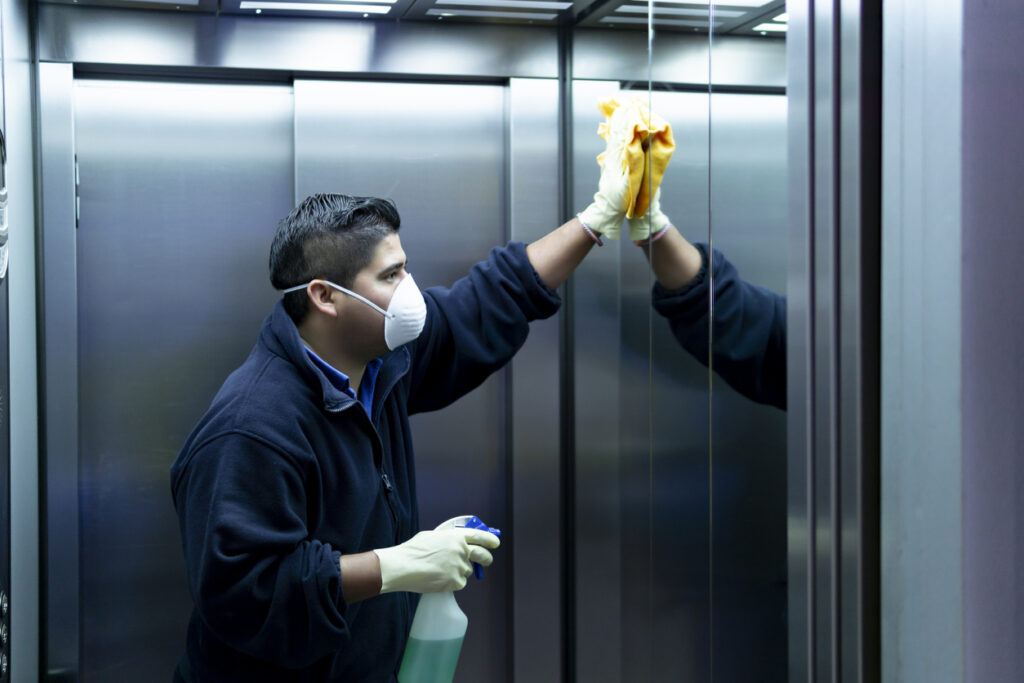Professional Disinfection Services


How Disinfection Service Works
After you select Citywide to perform professional disinfection services, a Citywide team member will coordinate with you to set a time to perform the service. Be sure to give time for your building occupants to prepare for the service.
Citywide uses a mix of electrostatic sprayers, misters, and automatic sprayers to evenly disperse EPA approved disinfectant products onto surfaces.
The process for disinfecting your building is as follows:
- The disinfection product is mixed according to manufacture recommendations and loaded into the machine.
- Using sprayers, all surfaces are coated with the product and allowed to air dry.
- This air-drying is essential as the surfaces must be wet long enough for the product to meet its kill claim.
a. In some situations, the disinfectant dries too quickly and a second pass is needed to ensure the required dwell time is met. - Some surfaces are not able to be sprayed due to sensitive electronics. These areas are manually wiped with pre-soaked disposable cleaning cloths.
How to Prepare for our Service
To ensure maximum effectiveness of the service it is recommended to communicate the following points to your building occupants.
- Clear all surfaces of papers and books. While the technicians will do their best to avoid any papers on the desks, it is impossible to prevent some overspray on desks and tables. As a result, papers left on a desk may get damp.
- If you do not want keyboards sprayed, lift them out of the way. Otherwise, they will receive a disinfection treatment.
- Any areas that should not be sprayed should be identified with a sign.
- The product being used should dry with no residue; however, it is possible that there could be some water residue marks left behind. This residue is harmless and is caused by the water and not the chemical.
- Make sure all chairs are accessible. Stacked chairs will not be unstacked without an extra charge.
Cleaning vs. Disinfecting
This service is not intended to take the place of regular cleaning efforts. Extra charges may occur if the technicians are required to perform extra cleaning efforts. Technicians arrive with equipment for covering surfaces with a disinfectant and generally speaking, are not equipped for cleaning. It is advisable that people clean off their personal workstations the night before disinfection services so that the cleaning service can dust and clean these areas before the disinfection process begins.
Areas Serviced
COMING SOON
Scope of Work – Commercial Office
This scope of work is for frequent disinfection of touchpoints.
The areas and items listed below will receive an application of a disinfectant at the agreed-upon schedule.
The product used will contain a virucide. The virucide will be sprayed on surfaces and allowed to air dry so that the product can remain on the surface long enough to meet its kill claim. Some residue may remain on surfaces after disinfection is performed.
Office Space

Offices, Conference rooms, Copy rooms, Training rooms (Secondary aisles included)
- Door knobs, handles, & push plates
- Light switches and thermostats
- Area around keyboard and mice
- Keyboards and mice
- Phones
- Chair arms
- Conference room tables
Common Areas
Primary aisles, Reception areas, Lobbies, Entrances, Elevators, Vending areas
- Door knobs, handles, & push plates
- Light switches and thermostats
- Countertops
- Around handles of cabinets
- Tables
- Chairs
- Microwave exteriors
- Appliance exteriors
Aseptic Areas
Restrooms, Locker rooms, Break rooms, Drinking fountains
- Door knobs, handles, & push plates
- Light switches and thermostats
- Drinking fountains
- Restroom fixtures (sinks, toilets, urinals, showers)
- Stall partitions
- Dispensers
- Countertops
- Any cabinet or drawer hardware
Scope of Work – Education
This scope of work is for frequent disinfection of touchpoints.
The areas and items listed below will receive an application of a disinfectant at the agreed-upon schedule.
The product used will contain a virucide. The virucide will be sprayed on surfaces and allowed to air dry so that the product can remain on the surface long enough to meet its kill claim. Some residue may remain on surfaces after disinfection is performed.
Classrooms
Classrooms, special ed rooms, teachers lounge
- Door knobs, handles, & push plates
- Light switches and thermostats
- Area around keyboard and mice
- Keyboards and mice
- Phones
- Chairs
- Student desk tops (not inside of desks)
- Teachers lounge table tops
- Open locker insides. Closed locker outsides.
- Teachers Desk
Office Space
Offices, Conference rooms, Copy rooms, Training rooms (Secondary aisles included)
- Door knobs, handles, & push plates
- Light switches and thermostats
- Area around keyboard and mice
- Keyboards and mice
- Phones
- Chair arms
- Conference room tables
Common Areas
Primary aisles, Reception areas, Lobbies, Entrances, Elevators, Cafeteria
- Door knobs, handles, & push plates
- Light switches and thermostats
- Countertops
- Around handles of cabinets
- Tables
- Chairs
- Microwave exteriors
- Appliance exteriors
- Locker faces
- Handrails
- Elevators buttons
- Reception desks and counters
Aseptic Areas
Restrooms, Locker rooms, Break rooms, Drinking fountains
- Door knobs, handles, & push plates
- Light switches and thermostats
- Drinking fountains
- Restroom fixtures (sinks, toilets, urinals, showers)
- Stall partitions
- Dispensers
- Countertops
- Any cabinet or drawer hardware
Disinfection of Entire Facility
This service will provide coverage to surfaces with an EPA registered disinfection solution using electrostatic sprayers, foggers, spray bottles, and wiping if needed. All horizontal surfaces, “Common Use” HTPs, “Personal Use” HTPs (e.g. Desk phones, keyboards, etc.), restrooms, breakrooms, and other common areas will be disinfected. See below for the full list of surfaces.
Office Space Offices, Conference rooms, Copy rooms, Training rooms (Secondary aisles included)
Door knobs, handles, & push plates, Light switches and thermostats, Office Desks/Cubicle Desks, Area around keyboard and mice, Keyboards and mice, Phones, Chair arms, Conference room tables
Common Areas Primary aisles, Reception areas, Lobbies, Entrances, Elevators, Vending areas
Door knobs, handles, & push plates, Light switches and thermostats, Countertops, Cabinet and drawer handles, Tables & Chairs, Microwave exteriors, Appliance exteriors
Aseptic Areas Restrooms, Locker rooms, Breakrooms
Drinking fountains, Door knobs, handles, push plates, light switches and thermostats, Drinking fountains, Restroom fixtures (sinks, toilets, urinals, showers), Stall partitions, Dispensers, Countertops, Cabinet and drawer handles
Additional Notes
1. Lead time of service commencement and timeline of service completion is directly subject to availability of labor personnel at time of request, and timing of request as it relates to ongoing execution of similar service requests.
2. Execution of services is dependent on availability of critical resources and equipment necessary to complete the request in an effective manner.
3. Commencement and execution of services are dependent on the availability of appropriate PPE for all service personnel dispatched post identification of infectious areas.
Excluded Surfaces
This service will not cover the following materials.
1. Cloth, fabric, and upholstery
2. Carpeting
3. Paper
4. Cardboard
Electrostatic Sprayers
At Citywide we use electrostatic sprayers manufactured by Victory Innovations. (https://victorycomplete.com/) Our crews utilize a backpack and handheld version.
Using the electrostatic sprayers will enable a quick and effective chemical application. As fully-charged droplets hit the surface they create an even spread. Particles hold their cationic charge for approx. 2-3 seconds – preventing drips. This allows the solution to cover hidden and shadowed areas, and also enables our technicians to cover a large area in a small amount of time. These sprayers have been designed to meet dwell times for solutions so they can work to their full capabilities.

Frequently Asked Questions
Q. Do we need to vacate the space for you to perform the service?
A. While it is preferred to have free access to a facility while unoccupied, we understand that some facilities operate with longer hours and shutdowns can be costly. We can perform our service in smaller portions of the building and having the area being actively disinfected clear from all staff.
Q. How soon after the service can we use the space again?
A. The areas being disinfected are safe to use 20 minutes after a technician has left the area.
Q. Will you manually wipe things?
A. We will only manually wipe those items that cannot be sprayed but still need disinfection. Wiping is just another method of applying a disinfection solution. The act of using a wipe does not provide any increased efficacy over spraying with an electrostatic unit.
Q. How many people will be doing the work?
A. This can change depending on the volume of jobs being performed by Citywide at a given time. Sometimes we need to get more jobs completed in a single day and we will send a larger crew to increase the volume that is being done per hour. Other times we have room in the schedule and so a smaller crew will be sent. We also use different applicators, and some can apply the disinfectant product faster which reduces the number of needed employees.
Q. Can you tell me how long the service will take?
A. While that can be tricky to say for sure, a good rule of thumb is that we can disinfect at 10,000 sqft per hour. That does not include setup and cleanup, and this is with minimal manual wiping off surfaces. Your rep can give you an estimate, but it can be challenging to predict.
Q. I only have a small window when you can access the facility. Can you get it done in that amount of time?
A. If you have time constraints, please let your sales rep know so that he/she can communicate that with our operations coordinator who facilities scheduling.
Q. Do you do this on weekends?
A. Yes! We perform this service 7 days a week. We also work in the daytime and nighttime hours.
Q. Why is the service so expensive?
A. The employees who perform this work are putting their health at risk every time they show up to perform one of these jobs. As a result, we pay hazard pay to these team members. The service also includes all PPE, specialized equipment, and disinfectants. All of which are difficult to obtain and are often at prices significantly higher than normal. The crew members are also properly trained on how to prevent cross contamination and how to properly apply a disinfectant to ensure the kill claim can be met. If you have budgetary constraints, please let us know and we can work with you to provide a service that fits your budget.
Q. Does Citywide have any certifications for this work?
A. At the present moment, there are no specific industry certifications for this sort of work. There are some new associations forming which are creating a curriculum for certification. We are keeping an eye on these firms and once there is effective certifications we will be securing those.
